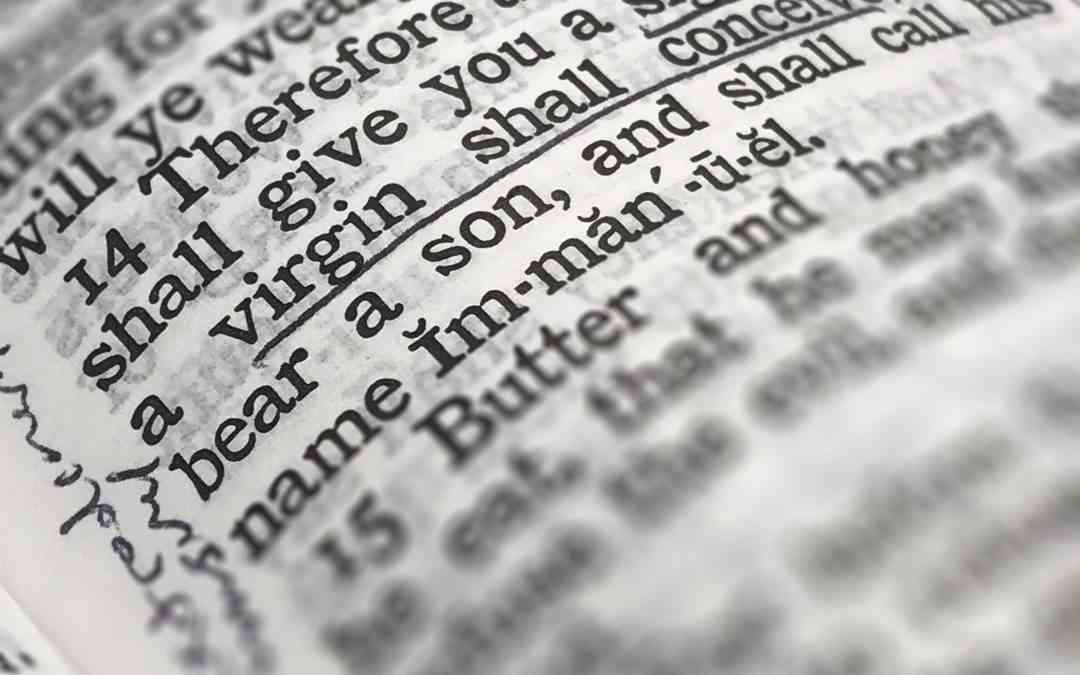
Here again, the word betula by itself does not seem to be enough to indicate virginity, since the narrator specifies that no man had known her. But further down in the chapter, in vv. 42-43, when the servant is recounting the story to Rebekah’s family, he says, "I came today to the spring and said, ‘Yahweh, the God of my master Abraham, if now you are prospering the way that I go, behold, I am standing by the spring of water. Let the [alma] who comes out to draw water, to whom I shall say, “Please give me a little water from your jar to drink…”
Here alma seems to assume the virgin condition that betula does not. It is a summary term for Rebekah’s status. Alma is a less common word, occurring only 9x in the Old Testament, and granted, in a few of those cases the context gives no clue one way or the other whether a virgin is in view (e.g., “The singers in front, the musicians last, between them [almot, plural] playing tambourines” – Psalm 68:25). But when the context does offer a hint, as in Genesis 24:43, alma does clearly refer to a “virgin.”
Another example is Song of Solomon 6:8, “There are sixty queens and eighty concubines, and [almot, plural] without number.” Here virgins (almot) are distinguished from queens and concubines. One scholar, Alec Motyer, sums up this linguistic evidence this way:
There is no ground for the common assertion that had Isaiah intended virgo intacta he would have used betula.
Alma lies closer to this meaning than the other word. In fact, this is its meaning in every explicit context. Isaiah thus used the word which, among those available to him, came nearest to expressing ‘virgin birth’ and which, without linguistic impropriety, opens the door to such a meaning.
Added to this is the fact that the Greek Old Testament (which Matthew quotes in his gospel) translates alma with the Greek word parthenos (παρθένος), which does mean “virgin.”
So the pre-New Testament translators of the Old Testament understood alma to mean virgin, at least in this instance, and they certainly had no theological agenda regarding Jesus. R.T. France, a bit more reticent than Motyer and saying that alma “does not explicitly mean ‘virgin,’” still acknowledges that the context in Isaiah “suggests something other than a normal childbirth within marriage,” and he assumes that it was on that basis that the Greek translators of the Old Testament rendered the word as parthenos—“virgin.”
The truth then appears to be that betula and alma are both words that can translate as virgin if the context points in that direction, even if virgin is neither word’s technical meaning. It should be remembered as well that in Ancient Near East culture any girl who was unmarried would be expected and assumed to be a virgin.
- Is "Virgin" the Correct Translation of Isaiah 7:14?
Keep Reading
So we may conclude that Isaiah’s language is not as unambiguous as we might like, but that “virgin” is a perfectly fair and even probable translation. In addition, it ought to be said that however open to interpretation Isaiah’s original statement may be, Matthew’s account of Jesus’ birth is certainly clear enough. Believers will of course accept Matthew’s interpretation of Isaiah as inspired by the Spirit and therefore valid, but in any case the historical fact of the virgin birth does not ultimately depend on the precise meaning of alma. Luke, who is especially acting as a reporter of history, also recounts the virgin conception, and never cites Isaiah’s prophecy.
So testimony to the virgin birth can stand quite apart from Matthew’s interpretation of Isaiah, flawed or not.
But now we need to address another issue: If Isaiah indeed foresaw and spoke concerning the birth of Jesus to the virgin Mary, how could this serve as a sign for Ahaz who died centuries before it would come to pass?
The Lord Himself will give you a sign
A second reason why skeptics will deny the virgin birth as the fulfillment of Isaiah’s prophecy is that it does not seem to work as a “sign” for Ahaz. King Ahaz would be dead long before Jesus was born.
But hold up. First, the Lord offers a sign to Ahaz that he would defend Jerusalem, but Ahaz rebelliously refused it. In reply, the prophet addresses not Ahaz personally but the house of David: “Hear then, O house of David! Is it too little for you to weary men, that you weary my God also? Therefore the Lord himself will give you a sign . . .” (Isaiah 7:13-14). In Hebrew, the you’s in this passage are plural. So the proper recipients of the sign are a broader category than Ahaz personally. The promise is made to the entire royal house as such.
Second, according to Isaiah 7:15-16, by the time the child spoken of in the sign grows up, the threat that Ahaz faces will be in some sense over with. “For before the boy knows how to refuse the evil and choose the good, the land whose two kings you dread will be deserted” (v. 16).[1] It is the case that when Jesus was born, Assyria was long gone as an empire, the northern kingdom of Israel was gone, and the kingdom of Syria as well was simply a Roman province. The fulfillment might therefore have been further off in the future than Ahaz or even Isaiah realised, but the explicit terms of the promise were still met in Jesus’ birth.
Third, if the sign does in fact refer to a normal (non-virgin) birth which Ahaz would see, the question arises: What is the sign quality in that? A young woman will have a baby. So? Children are born all the time.
On the other hand, if Isaiah did speak of a virgin birth, but it was one that was to take place during Ahaz’s lifetime (as some actually suppose), why was the fulfillment of the sign never recorded? God had offered a sign as “deep as Sheol or high as heaven” (v. 11), but when it came to pass it was apparently so undramatic that it wasn’t worth mentioning? That seems unlikely.
The reality is that as we read on in Isaiah, we hear more in the very near context about a child being born, a son being given, who would bear the government on his shoulder and be called “Wonderful Counsellor, Mighty God, Everlasting Father, Prince of Peace” (9:6), and this was to be a royal son of the house of David, whose rule would have no end (9:7).
In chapter 11 we again hear about a “shoot from the stump of Jesse.” The Lord promised a sign to the house of David, a virgin bearing a son, who would represent the presence of God with his people—God with us.[2] Isaiah 7:14 does not stand in isolation, but must be read in light of Isaiah’s broader outlook. The whole scenario and context points to something quite special which may indeed lay beyond the horizon of Ahaz.
Ahaz and his house would have no royal power when this sign came to fulfillment. Because of Ahaz’s capitulation to Assyria, Judah would become a puppet-state and hardly ever again be a fully independent power, but would be subject to foreign empires in one way or another even until the time of Christ.
As Motyer puts it, “Because of [Ahaz’s] unbelief the promised Messiah would be born into poverty, heir to a meaningless throne in a conquered land.”
In this regard, the sign of the virgin birth functions partly as a word of judgment: Immanuel would have no human father, and thus Ahaz and his successors would not father the royal Saviour in a physical sense.
The virgin birth implies a broader judgment than this though: It is a judgment on human nature.
Not human nature as such or as created, but simply on human nature as corrupt in Adam.
The rebuke on Ahaz is thus ultimately turned into a blessing, as the child born of the virgin would mean the birth of a new Adam, ultimately saving not only Israel but offering a fresh start to the whole of humanity.











